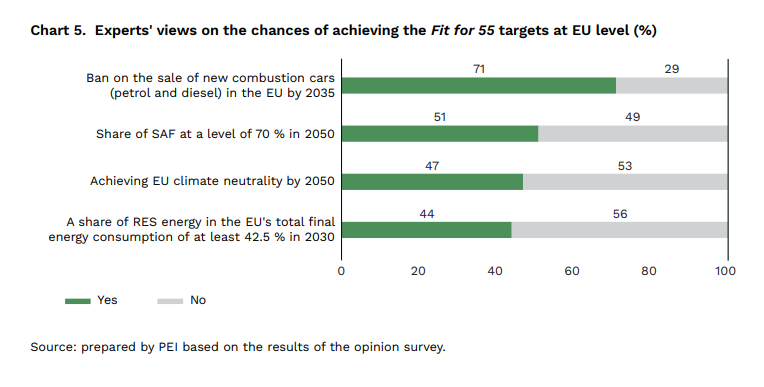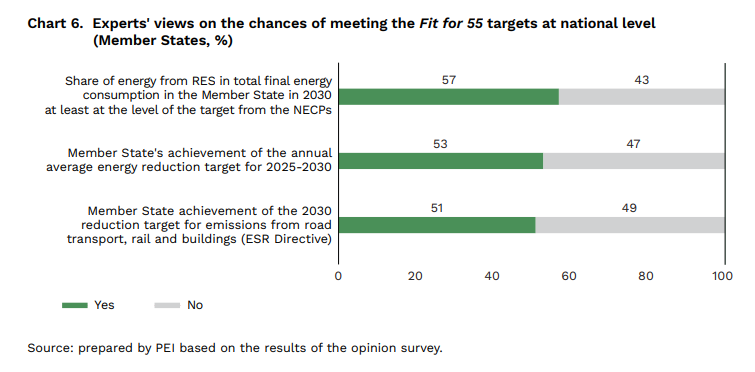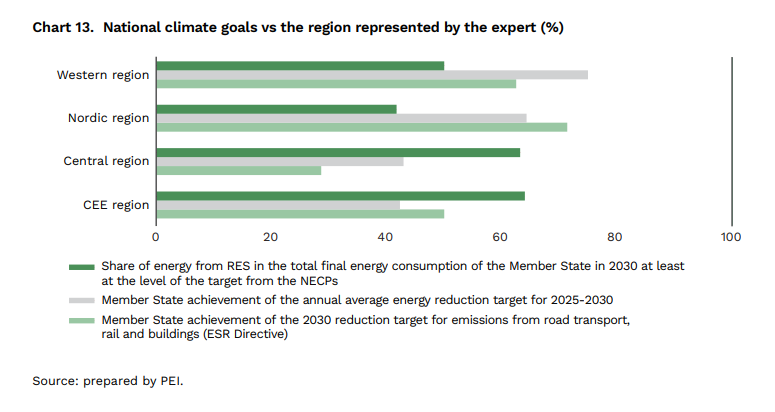Most European experts sceptical about the EU achieving climate neutrality by 2050
Opublikowano: 13/03/2024
The Polish Economic Institute analysed the predictions of energy sector experts from 23 EU Member States about meeting the targets of EU climate and energy policy. The least concern is the ban on the sale of combustion passenger cars before 2035 - more than 70 % of those surveyed believe this is achievable. At the same time, only 44 % of the experts surveyed believe that the EU will have achieved climate neutrality by 2050. The biggest doubt is about meeting the target for the share of RES in the EU's energy mix in 2030 - 56 % of them believed that it would not be possible to meet this target by that date. Fewer than one in three experts (29 %) from Central Europe were confident that their country would meet the CO2 reduction targets set out in the Effort Sharing Regulation (ESR). The most controversial topics the European experts disagree on are the electrification of district heating and the future of nuclear power. These are the main conclusions of the Polish Economic Institute's report entitled "Challenges of the Fit For 55 package: EU expert feedback on the targets of the energy transition."
In the European Union, discussions on achieving climate neutrality have been ongoing for years, but representatives of the individual EU countries cannot agree on the pace or path of the transformation. Some Member States suggest that the EU targets set by, inter alia, the Fit for 55 package are too challenging, while others call for an increase in the pace of the energy transition and even more stringent climate targets. These discrepancies prompted the Polish Economic Institute to investigate the opinions of European experts and chart the potential impact of their attitudes on the implementation of EU climate policy goals.
PEI investigated the experts’ opinions on the implementation of EU targets (share of RES in total EU final energy consumption in 2030, ban on the sale of new internal combustion cars in the EU by 2035, share of sustainable aviation fuels at 70 % in 2050, EU achieving climate neutrality by 2050), as well as national targets (share of RES in the country’s total final energy consumption in 2030, reduction in emissions from road transport, rail and buildings by 2030, average annual reduction in energy consumption between 2025 and 2030).
“In the study, we focused on the objectives and issues presented in several different directives (EU ETS, EED, RED III, EPBD, CBAM, the ReFuelEU Aviation initiative and the ESR). These have specific, quantified targets that experts easily refer to. The least controversial was the feasibility of the target to ban the sale of combustion passenger cars before 2035. More than 70 % of the experts believed the target could be achieved. The biggest doubt, however, regarded the target for the share of RES in the EU’s energy mix in 2030- as many as 56 % of the experts didn’t trust that the target could be achieved. At the same time, our survey showed that the experts are more optimistic in declaring the feasibility of their own countries’ national climate policy targets than most EU targets. This may indicate a lack of confidence in the effectiveness of coordination efforts at EU level. The PEI survey also confirmed two main points of dispute in the European energy sector: the future of nuclear power and the electrification of individual and district heating,” says Marcelina Pilszyk, Senior Advisor in the Climate and Energy Team.
Most of the experts believed that the country they represent would meet the target declared in the National Energy and Climate Plan for the share of RES in the energy mix in 2030, reduce primary energy consumption and limit emissions from road transport to the required levels. At the same time, as many as 56 % of them were of the opinion that the target of a 42.5 % RES share in the EU energy mix in 2030 would not be met. Only 13 % felt that their country would not meet any of the three national climate policy targets. At the same time, only 16 % believed that each target would be met in time.
“The PEI survey showed that attitudes towards the chances of meeting EU climate targets are closely related to the country or region represented by specific experts. These from the Central and Central and Eastern Europe were much more optimistic in their assessment of the chances of meeting the national RES target (lower than in other regions), but sceptical about the chances of their country reducing energy consumption and emissions from buildings and road transport. Only 29 % of those from Central Europe were convinced that their country would meet the ESR targets, compared to 71 % from the Nordic region. The experts from Western Europe were the most optimistic about reducing energy consumption, with 75 % believing that their country would meet this target. The experts from Central and Eastern European countries were the most sceptical about reducing energy consumption – only 42 % believed that their country would meet the declared target,” points out Kamil Lipinski, Head of the Climate and Energy Team.
The higher the climate targets of the country represented by the expert, the greater was their scepticism about the possibility of achieving them. 64 % of the experts from CEE were of the opinion that the country would meet the RES target set in the National Energy and Climate Plan. This was the opinion of 63 % of the experts from Central Europe, 50 % from Western Europe and only 42 % from the Nordic region, the most ambitious one in this area.
Based on the survey results, four main types of experts’ attitudes emerged:
- Pro-Fossil Sceptics – are not opposed to EU climate policy, but assume a slower pace of transition and that fossil fuels will retain a significant position in the energy mix
- Nuclear Disruptors – support the development of nuclear energy and are the most sceptical about meeting EU targets; this group most often points to nuclear power, sometimes in combination with photovoltaics
- Nuclear Transformers – believe in meeting the national RES target, support nuclear power but emphasise the key role of RES in transforming the electricity sector.
- Green Enthusiasts – foresee electrification of heating and nuclear phase-out, and they are the most optimistic group among the experts.
***
The Polish Economic Institute is a public economic think tank dating back to 1928. Its research primarily spans macroeconomics, energy and climate, foreign trade, economic foresight, the digital economy and behavioural economics. The Institute provides reports, analyses, and recommendations for key areas of the economy and social life in Poland, taking into account the international situation.
Media contact:
Ewa Balicka-Sawiak
Press Officer
M: +48 727 427 918
E: ewa.balicka@pie.net.pl
Category: Climate and Energy / Press releases / Report / Reports 2024





